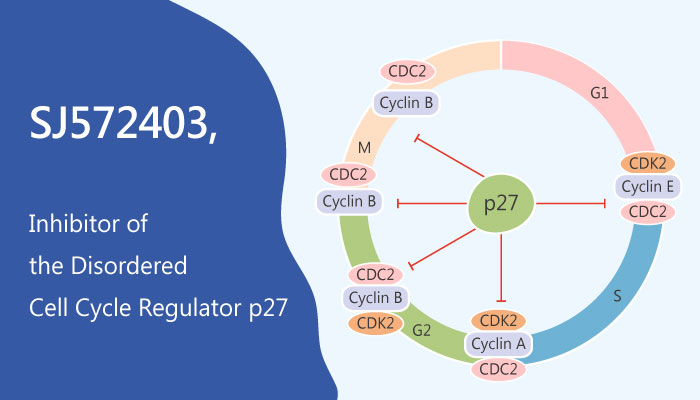The p27Kip1 is a member of the universal cyclin-dependent kinase inhibitor family. In particular, the p27Kip1 is a multi-functional CDK inhibitor with prognostic significance in human cancers. The p27Kip1 controls eukaryotic cell division. The p27 also is a putative tumor suppressor gene, regulator of drug resistance in solid tumors, and promoter of apoptosis. moreover, p27 also acts as a safeguard against inflammatory injury; and has a role in cell differentiation. Some specific growth factors regulate p27 expression, such as transforming growth factor (TGF)-β. The N-terminal, kinase inhibitory domain of p27 (p27-KID) binds to and regulates the catalytic activity of nuclear Cdk/cyclin complexes that control eukaryotic cell division.
Gratifyingly, the availability of a small molecule inhibitor of p27 be beneficial to prevent abnormal migration of breast cancer cells. Of these, SJ572403 is an inhibitor of disordered protein p27Kip1. In this study, Iconaru LI, et al used SJ572403 to test that molecules bind to p27 can alter its Cdk regulatory function. For these experiments, Iconaru LI, et al studied SJ572403 to modulate the binding of p27-D2 to Cdk2/cyclin A. Additionally, the Kd value binding to Cdk2/cyclin A is 73±8 nM and 5 nM for kinase inhibitory domain of p27. Titration of SJ572403 causes concentration-dependent reduction of fluorescence anisotropy of p27-D2-FL, with an IC50 value of 475±67 μM. Consequently, SJ572403 displaces p27-D2 from Cdk2/cyclin A. Furthermore, in the absence of p27-D2, SJ572403 substantially inhibits Cdk2/cyclin A activity.
All in all, SJ572403 inhibits the function of a disordered protein. SJ572403 inhibits the sequestration in a conformation incapable of binding and inhibiting Cdk2/cyclin A.
